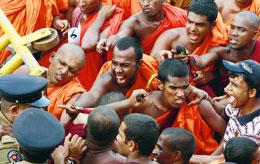Hardline Buddhist monks spread hate across Asia

Canada has joined a growing global chorus of condemnation against the violence targeting Muslims, including the burning of mosques and businesses in Kandy and other parts of Sri Lanka.
“Canada is deeply concerned by recent inter-communal violence in Sri Lanka, in which Muslims were targeted,” the country’s foreign minister, Chrystia Freeland said in a statement.
“Canada calls on the government to ensure the safety and security of all minorities, to protect human rights and fundamental freedoms for all and to hold those responsible for the violence accountable.”
Violent attacks against Muslims swept the central district of Kandy over the last weeks.
The violence, triggered by the death of a Sinhalese Buddhist man after being beaten by a group of Muslim men over a traffic dispute, left at least two dead with and mosques, dozens of homes, and businesses torched or destroyed.
Several dozen people were wounded in the riots.
Authorities declared a state of emergency and imposed a curfew in an attempt to curtail the violence, but Sri Lankan Muslims said they were concerned the attacks would continue.
Police have arrested the suspected instigators of the riots.
Last weekend, President Maithripala Sirisena announced a three-member panel will be appointed to investigate and lifted the curfew. However, soldiers remained in the streets.
The violence has raised fears of instability in Sri Lanka, a South Asian island nation still struggling to recover from nearly three decades of ethnic civil war.
The European Union’s delegation in Sri Lanka called for the perpetrators to be brought to justice, saying in a statement:
“The recent attacks on communities are very worrying. It is important that the Government and the security forces take urgent action against hate crimes and ensure that the perpetrators of such actions are swiftly brought to justice.”
Referring to the state of emergency called by the government, the EU delegation said, “the EU trusts that any actions taken under the State of Emergency will be proportionate and respect constitutional rights and freedoms.”
The British High Commissioner for Sri Lanka said in a tweet, “recent inter-communal violence needs to be a serious concern for everyone in Sri Lanka.”
The violence in Sri Lanka also reflects a surge in violent rhetoric from small but increasingly influential groups of hardline monks in parts of Asia.
In Myanmar, ultranationalist monks led by firebrand preacher Wirathu have poured vitriol on the country's small Muslim population, cheering a military crackdown forcing nearly 700,000 Rohingya into Bangladesh.
And in neighbouring Thailand, a prominent monk found himself in hot water for calling on followers to burn down mosques.
Michael Jerryson, an expert on religion at Youngstown State University who has just completed a book exploring Buddhism and violence, says throughout history some Buddhists like any faith have used religion to justify violence.
"There's a common mindset, whether it's Sri Lanka, Myanmar, Thailand... that Buddhism is somehow under threat," he said, describing the latest incarnation of violent Buddhist rhetoric.
"Each area has its own history, its own causes and instigators, but these instigators are also interlinked."
In many recent cases around Asia, this aggression has been targeted toward Muslims.
Despite centuries of largely peaceful coexistence and trading, Buddhist fundamentalist groups portray Islam as invasive, toppling ancient Buddhist empires in Malaysia and Indonesia and now threatening the same for modern Buddhist nations through jihad or high
In Sri Lanka, Buddhist militancy has gone mainstream, with clergy seen clashing with riot police and leading antigovernment protests.
During the brutal 26-year civil war, the ire of ultranationalists among the mainly Buddhist Sinhalese majority was focused on the island's Tamil population.
But after the Tamil Tigers were beaten in 2009, hardliners turned on Muslims, who make up some 10 percent of the population.
Monk Galagodaatte Gnanasara, the movement's most prominent leader, is on bail facing hate speech charges and insulting the Koran.
"The Koran should be banned in the country," he said recently. "If you don't, we will go from house to house and campaign till it is banned."
His movement BBS Buddhist Force hosted Wirathu and his followers in September 2014.
In Thailand, antiMuslim hardliners have had less success.
Experts say Buddhist clergy can trigger violence without directly participating in it.
"With a couple of very rare exceptions Buddhist monastic groups don't carry out the violence themselves," explains Iselin Frydenlund, from the Norwegian School of Theology, who has written extensively about what she dubs "Buddhist protectionist" movements in Myanmar and Sri Lanka.
"But what they will do is provide the justification for the use of violence carried out by others, be they vigilante groups, civilians, police or soldiers."
It is not just global Islamophobia fuelling these groups, she adds colonial history, globalisation and the advance of secularism play their part.
"People feel they are losing their traditions."
Jerryson says he fears the recent religious communalism could spread to vulnerable minorities, such as Buddhists in Bangladesh's Chittagong Hill Tracts.
"By labelling Muslims as adversaries to Buddhism, which historically has not been true, it solidifies the perception that the relationship is adversarial," he warns.









